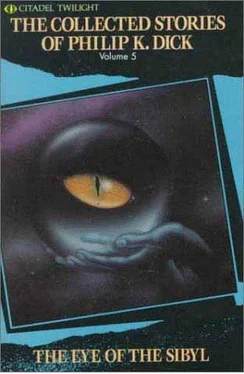“Freely?” Bibleman said.
“Well, no. But the agreement was known to you. When you discovered the schematics for the Panther Engine encoded in the College’s memory and available to anyone who happened for any reason, any reason whatsoever, to ask for a practical application of pre-Socratic—”
“I was as surprised as hell,” Bibleman said. “I still am.”
“Loyalty is an ethical principle. I’ll tell you what; I’ll waive the punishment factor and put it on the basis of loyalty to the College. A responsible person obeys laws and agreements entered into. Return the schematics and you can continue your courses here at the College. In fact, we’ll give you permission to select what subjects you want; they won’t be assigned to you. I think you’re good college material. Think it over and report back to me tomorrow morning, between eight and nine, here in my office. Don’t talk to anyone; don’t try to discuss it. You’ll be watched. Don’t try to leave the grounds. Okay?”
“Okay,” Bibleman said woodenly.
He dreamed that night that he had died. In his dream vast spaces stretched out, and his father was coming toward him, very slowly, out of a dark glade and into the sunlight. His father seemed glad to see him, and Bibleman felt his father’s love.
When he awoke, the feeling of being loved by his father remained. As he put on his uniform, he thought about his father and how rarely, in actual life, he had gotten that love. It made him feel lonely, now, his father being dead and his mother as well. Killed in a nuclear-power accident, along with a whole lot of other people
They say someone important to you waits for you on the other side, he thought. Maybe by the time I die Major Casals will be dead and he will be waiting for me, to greet me gladly. Major Casals and my father combined as one.
What am I going to do? he asked himself. They have waived the punitive aspects; it’s reduced to essentials, a matter of loyalty. Am I a loyal person? Do I qualify?
The hell with it, he said to himself. He looked at his watch. Eight-thirty. My father would be proud of me, he thought. For what I am going to do.
Going into the laundry room, he scoped out the situation. No robots in sight. He dug down in the pile of bed sheets, found the pages of schematics, took them out, looked them over, and headed for the tube that would take him to Major Casal’s office.
“You have them,” Casals said as Bibleman entered. Bibleman handed the three sheets of paper over to him.
“And you made no other copies?” Casals asked.
“No.”
“You give me your word of honor?”
“Yes,” Bibleman said.
“You are herewith expelled from the College,” Major Casals said.
“What?” Bibleman said.
Casals pressed a button on his desk. “Come in.”
The door opened and Mary Lorne stood there.
“I do not represent the College,” Major Casals said to Bibleman. “You were set up.”
“I am the College,” Mary said.
Major Casals said, “Sit down, Bibleman. She will explain it to you before you leave.”
“I failed?” Bibleman said.
“You failed me,” Mary said. “The purpose of the test was to teach you to stand on your own feet, even if it meant challenging authority. The covert message of institutions is: ‘Submit to that which you psychologically construe as an authority.’ A good school trains the whole person; it isn’t a matter of data and information; I was trying to make you morally and psychologically complete. But a person can’t be commanded to disobey. You can’t order someone to rebel. All I could do was give you a model, an example.”
Bibleman thought, When she talked back to Casals at the initial orientation. He felt numb.
“The Panther Engine is worthless,” Mary said, “as a technological artifact. This is a standard test we use on each student, no matter what study course he is assigned.”
“They all got a readout on the Panther Engine?” Bibleman said with disbelief. He stared at the girl.
“They will, one by one. Yours came very quickly. First you are told that it is classified; you are told the penalty for releasing classified information; then you are leaked the information. It is hoped that you will make it public or at least try to make it public.”
Major Casals said, “You saw on the third page of the printout that the engine supplied an economical source of hydroelectric power. That was important. You knew that the public would benefit if the engine design was released.”
“And legal penalties were waived,” Mary said. “So what you did was not done out of fear.”
“Loyalty,” Bibleman said. “I did it out of loyalty.”
“To what?” Mary said.
He was silent; he could not think.
“To a holoscreen?” Major Casals said.
“To you,” Bibleman said.
Major Casals said, “I am someone who insulted you and derided you. Someone who treated you like dirt. I told you that if I ordered you to piss purple, you—”
“Okay,” Bibleman said. “Enough.”
“Goodbye,” Mary said.
“What?” Bibleman said, startled.
“You’re leaving. You’re going back to your life and job, what you had before we picked you.”
Bibleman said, “I’d like another chance.”
“But,” Mary said, “you know how the test works now. So it can never be given to you again. You know what is really wanted from you by the College. I’m sorry.”
“I’m sorry, too,” Major Casals said.
Bibleman said nothing.
Holding out her hand, Mary said, “Shake?”
Blindly, Bibleman shook hands with her. Major Casals only stared at him blankly; he did not offer his hand. He seemed to be engrossed in some other topic, perhaps some other person. Another student was on his mind, perhaps. Bibleman could not tell.
Three nights later, as he wandered aimlessly through the mixture of lights and darkness of the city, Bob Bibleman saw ahead of him a robot food vendor at its eternal post. A teenage boy was in the process of buying a taco and an apple turnover. Bob Bibleman lined up behind the boy and stood waiting, his hands in his pockets, no thoughts coming to him, only a dull feeling, a sense of emptiness. As if the inattention which he had seen on Casal’s face had taken him over, he thought to himself. He felt like an object, an object among objects, like the robot vendor. Something which, as he well knew, did not look you directly in the eye.
“What’ll it be, sir?” the robot asked.
Bibleman said, “Fries, a cheeseburger, and a strawberry shake. Are there any contests?”
After a pause the robot said, “Not for you, Mr. Bibleman.”
“Okay,” he said, and stood waiting.
The food came, on its little throwaway plastic tray, in its little throwaway cartons.
“I’m not paying,” Bibleman said, and walked away.
The robot called after him, “Eleven hundred dollars. Mr. Bibleman. You’re breaking the law!”
He turned, got out his wallet.
“Thank you, Mr. Bibleman,” the robot said. “I am very proud of you.”
Chains of Air, Web of Aether
The planet on which he was living underwent each day two mornings. First CY30 appeared and then its minor twin put in a feeble appearance, as if God had not been able to make up His mind as to which sun He preferred and had finally settled on both. The domers liked to compare it to sequential settings of an old-fashioned multifilament incandescent bulb. CY30 gave the impression of getting up to about 150 watts and then came little CY30B, which added 50 more watts of light. The aggregate luminae made the methane crystals of the planet’s surface sparkle pleasantly, assuming you were indoors.
At the table of his dome, Leo McVane drank fake coffee and read the newspaper. He felt anxiety-free and warm because he had long ago illegally redesigned his dome’s thermostat. He felt safe as well because he had added an extra metal brace to the dome’s hatch. And he felt expectant because today the food man would be by, so there would be someone to talk to. It was a good day.
Читать дальше









